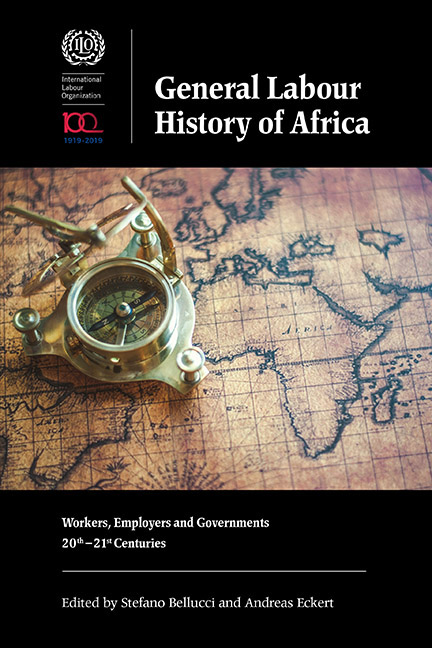Book contents
- Frontmatter
- Contents
- List of Maps and Figures
- List of Tables
- Notes on Contributors
- Foreword
- Acknowledgements
- The ‘Labour Question’ in Africanist Historiography
- Part I Free and Unfree Labour
- Part II Key Sectors
- Part III International Dimensions and Mobility
- Part IV Varieties of Work
- Part V Entrepreneurs and Self-Employment
- Part VI The State, Unions and Welfare
- 18 Labour and the State
- 19 Trade Unions
- 20 Social Welfare
- 21 Mutualism and Cooperative Work
- Part VII Conclusions
- Select Bibliography
- Index
18 - Labour and the State
from Part VI - The State, Unions and Welfare
Published online by Cambridge University Press: 21 September 2019
- Frontmatter
- Contents
- List of Maps and Figures
- List of Tables
- Notes on Contributors
- Foreword
- Acknowledgements
- The ‘Labour Question’ in Africanist Historiography
- Part I Free and Unfree Labour
- Part II Key Sectors
- Part III International Dimensions and Mobility
- Part IV Varieties of Work
- Part V Entrepreneurs and Self-Employment
- Part VI The State, Unions and Welfare
- 18 Labour and the State
- 19 Trade Unions
- 20 Social Welfare
- 21 Mutualism and Cooperative Work
- Part VII Conclusions
- Select Bibliography
- Index
Summary
The relationship between labour and the state in Africa does not differ greatly from what it is in other parts of the world. It is regulated through institutions and legislation and conditioned by production systems. To be able to trace the history of the changing relations between state and labour, one has to keep in mind not only the diverse capitalist modes of production that are prevalent on the continent, but also the different forms of states, be they colonial or national. The other key factor for the understanding of these labour–state relations are the scales on which they take place. Recent interpretations of the state insist on the fallacy of the view that takes ‘the state’ as a monolithic entity. The state, in the different places where labour operates, makes itself visible through a large array of institutions, norms and policies, practices and gestures. In the same way, labour cannot be defined simply; it is determined by the structure of the existing economy and the political conditions, as well as by the production system. These systems determine policies, such as migration procedures and access to education and training, which shape the emerging labour arrangements.
The present legislative and institutional architecture regulating labour relations in Africa has its roots in the different production modes that were shaped in particular historical contexts. Although various forms of pre-capitalist statehoods for organizing production existed in Africa before European contact, the colonial state played a significant role in determining the present forms of work and the kinds of labour that operate in large parts of Africa. The colonial experience is among the major factors of change at the continental scale. Under colonial rule and long after, labour legislation was used as a tool to rein in militancy among the African workforce.
This chapter explores the emergence and operation of state institutions and legislation regulating labour relations in Africa. It starts with the emergence of labour institutions in Africa but does not deal with forced and indentured labour, which is discussed in other chapters of this volume. This chapter outlines the institutional framework that states produced to mediate the relations between labour and capital, and tries to show the diversity as well as the similarities in the experiences that shaped the production modes in different parts of the continent.
- Type
- Chapter
- Information
- General Labour History of AfricaWorkers, Employers and Governments, 20th-21st Centuries, pp. 495 - 522Publisher: Boydell & BrewerPrint publication year: 2019

